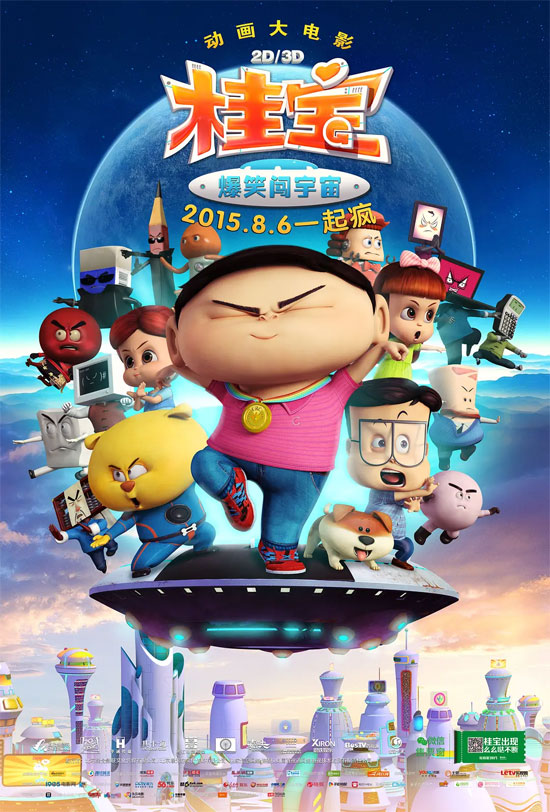Film Name: 桂宝之爆笑闯宇宙 / Kwai Boo

No time for long reviews? Check out these quick takes!
========================
The film successfully brings the flat, two-dimensional Keiba from the comics to life in 3D.
Apart from Jiji, the other characters around the protagonist mostly just make cameo appearances.
Keiba’s world is a dwarf’s world, so the film’s camera angles are lower than usual—sometimes you even have to look up at the short Keiba, which is fun.
The film depicts the struggle between destructive forces and protective powers.
The little kitchen robot’s extendable chef’s hat would have made for a great nod if used in the final battle—a missed opportunity.
The imaginative details in this film are rarely matched by previous domestic animations.
After the film’s dreamlike, surreal journey, I felt like I’d experienced a moment of pure joy followed by emptiness.
========================
Since I haven’t read Guibao’s comics, this film isn’t a fan-service movie for me—it’s just an ordinary animated feature. Once stripped of fan applause, once all commercial motives from conception to release are washed away, what truly remains becomes the most crucial question.
Is it a game and a dream, or a joy and an emptiness?
If we call it a game and a dream, then indeed, the film’s boundless imagination nurtures a pure, uniquely animated kind of wonder. You’ll notice every wall in every room adorned with richly detailed decorations. In truth, the level of imaginative detail here is rarely matched in domestic animation. But if this wild imagination fails to serve the film’s themes, it becomes mere flashy showmanship—at best, attention-grabbing spectacle rather than something that truly resonates.
One imaginative symbol in the film does resonate deeply: the sacred tree guarded by the aliens in the Lost City. This isn’t the first time the director has depicted reverence for a sacred tree in his work—it also appeared in his previous film, “Yugo & Lala 2.” The recurrence of this significant totem across two consecutive works reveals both its deep-rooted presence in the director’s imagination and, perhaps, a hint of creative exhaustion.
More crucially, the tree in “Yugo & Lala 2” carries a clear totemic meaning: it represents nature, inspiring profound reverence for the natural world. In “Kwai Boo,” the tree totem leaves its meaning ambiguous—perhaps embodying a wish for such an illusory entity. In “Yugo&Lala 2,” the tree totem appears during the climactic finale, when the audience’s emotional state is already heightened, making its impact deeply resonant. In “Kwai Boo,” however, this totem appears in the middle-to-late stages of the film. Just as the audience is about to be moved, they are abruptly brought back to reality before the final showdown, leaving them emotionally unsettled. When an emotional climax fails to coincide with the narrative climax, its impact is significantly diminished.
In my view, the bud that appears at the film’s conclusion should have emerged during its middle section. The aliens nurtured this seed with utmost care, even sacrificing their lives for it. This devotion unleashed all of Guibao’s latent potential. Finally, when everyone’s hopes converge, the seed transforms into a tree, becoming a totem that redeems lost lives—even the antagonist. Of course, this is merely one possible conclusion, one that simply resolves the audience’s need for cathartic resolution at the climax.
The film’s other dreamlike game involves venturing into the cosmos rather than Blue Whale City, which also feels wildly imaginative. Yet whether it’s Rebecca Forstadt or WALL·E, classic animations consistently remind us: those who journey from Earth to the universe must ultimately return. Everything they experience in outer space remains intimately connected to Earth, concerning its safety—no matter how dire its condition.
This is a simple truth: Earth is our only home. Only when a film’s plot concerns our home do we truly care about it.
“Kwai Boo’s” fantastical cosmic adventure originates from her own loss on Earth, yet afterward, like the Malaysia Airlines flight, she loses contact with us. We could even care less about their cosmic escapades, as they hold almost no connection to Earth or Blue Whale City—at least the film fails to establish such ties, leaving us without a palpable sense of urgent crisis.
In this sense, either the entire opening sequence in Blue Whale City is irrelevant filler unrelated to the cosmic adventure, or the entire cosmic adventure is irrelevant filler disconnected from Earth. What we truly anticipate is the heroic deeds of Guibao defending Earth (and incidentally saving the universe), the climactic battle unfolding on our planet, where Blue Whale City’s adults—who once misunderstood Guibao—rediscover this courageous, dream-filled youth. We yearn for the tree totem to take root on Earth alongside the alien visitors arriving in Blue Whale City. Of course, this is merely another possible ending. It simply resolves the issue of making the film relevant to us, allowing us to instinctively invest more emotional attachment.
Ah, after this dizzying, dreamlike game of illusion, we realize we’ve merely experienced a fleeting, illusory joy—and in the end, it all amounts to nothing.
Please specify:Anime Phone Cases » Kwai Boo 2015 Animation Film Review: A moment of joy, a moment of emptiness